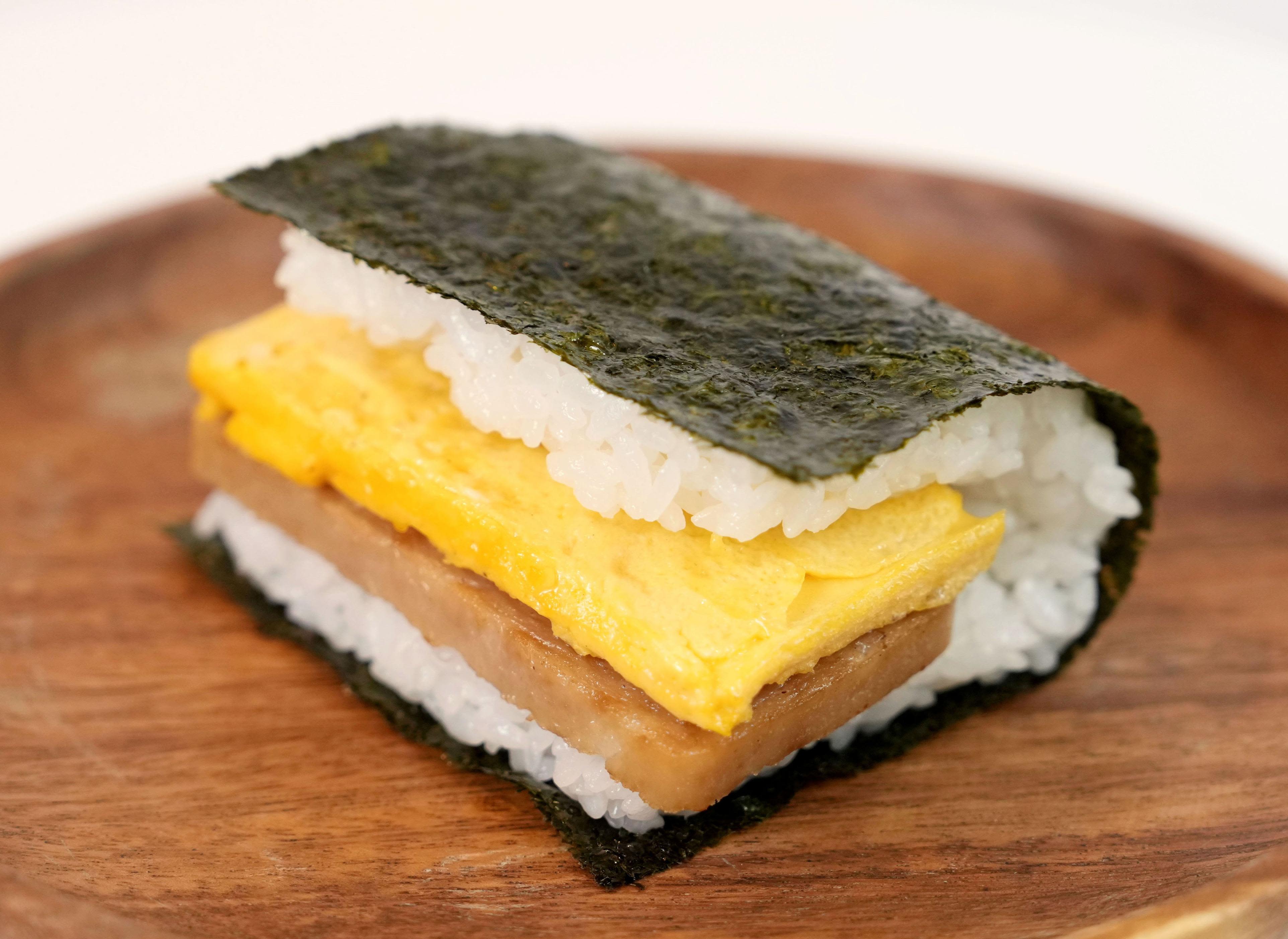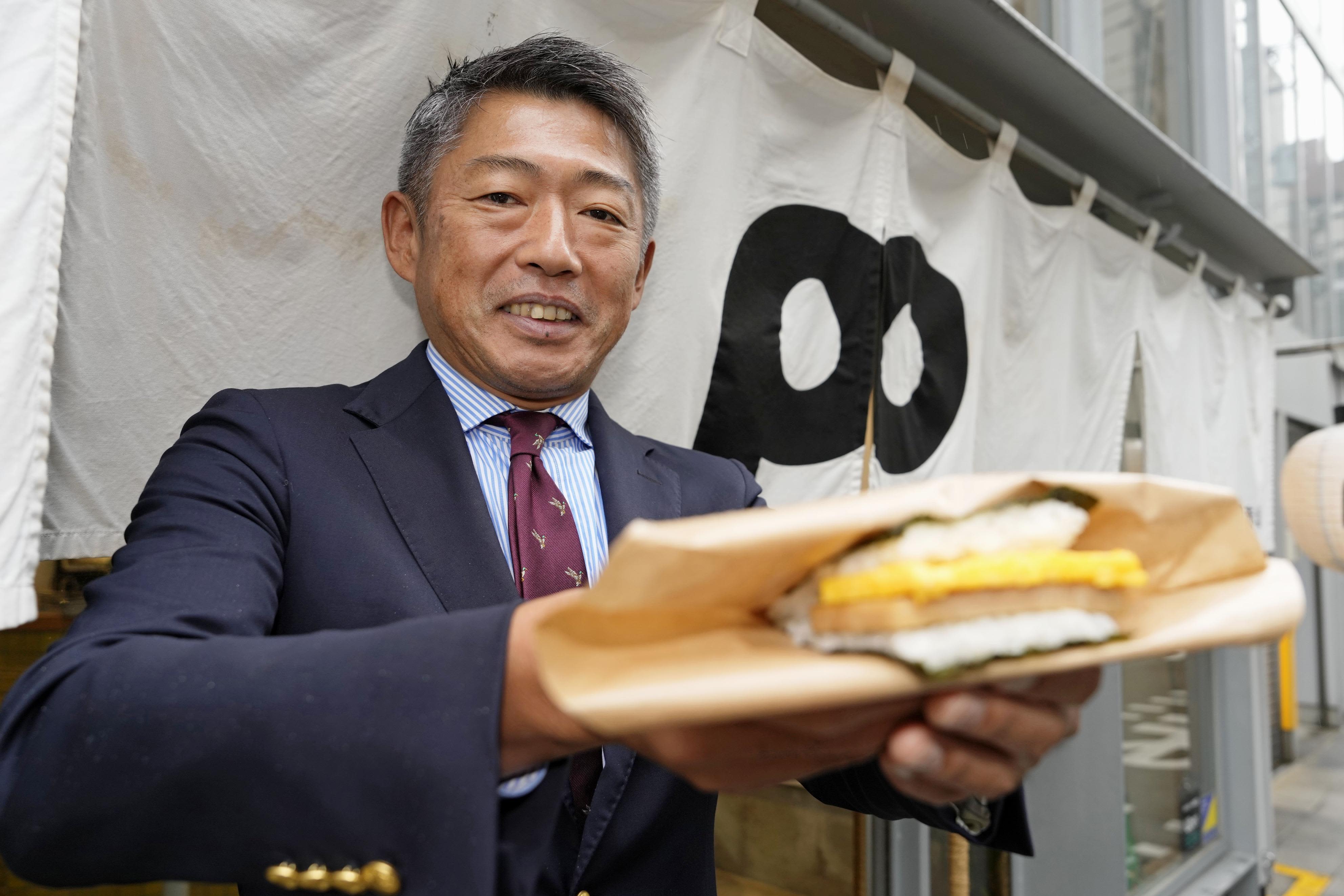Okinawan Spam soul food sandwich on a roll worldwide

The success of a Japanese man who took an "onigiri" rice ball sandwich known for years as the soul food of Okinawa and turned it into a booming franchise began when his wife cooked the pork and fried egg snack for him one morning at home.

Shortly after his culinary revelation about a decade ago, Katsuaki Kiyokawa, 54, started a restaurant specializing in the pork tamago onigiri sandwiches, and his chain Potama Co. has since grown rapidly beyond Okinawa to big cities like Tokyo and Fukuoka, as well as overseas to Hawaii.

Rival shops have also sprung up to take advantage of the craze for the hot and fluffy treats, inspiring the food industry in Okinawa to try expanding the appeal of other local cuisines and specialties.
Pork tamago onigiri are made of simple ingredients: grilled Spam, the canned meat which has become a common sight in countries around the world, and fried eggs wrapped in rice and dried seaweed.
Like fast food, they can be easily held in one hand and eaten on the fly, contributing to the food's allure for people inside and outside of Japan.
Long a staple food and home-style meal in Okinawa, major convenience store chain FamilyMart Co. began selling pork tamago onigiri in the prefecture in April 2000. Now, it is widely sold at "obento" take-out lunchbox shops and convenience stores.
In October 2022, a Tokyo-based information technology firm began a delivery service featuring the hearty snack. A recent onigiri boom has also helped boost its popularity.

©️Potama
©️Potama

©️Potama
©️Potama
©️potama


Spam, a processed can pork and ham product introduced in 1937 in the United States, became a central part of the U.S. military diet during World War II, mainly because it does not need refrigeration.
The product was well received in Okinawa and was absorbed into the local diet during the Allies' occupation and subsequent governance under U.S. military authority.

U.S. solders on the frontline have a meal in 1944.
U.S. solders on the frontline have a meal in 1944.
Okinawans, who had long been raising pigs and had taken to pork as part of their diet, adopted Spam in a variety of dishes, including champuru stir-fry and some soups.

"Goya Champuru" stir-fry dish using goya bitter melon and Spam, a quintessential Okinawan cuisine.
"Goya Champuru" stir-fry dish using goya bitter melon and Spam, a quintessential Okinawan cuisine.
Spam has also thrived in the local diets of other Asian countries. In South Korea, according to the Encyclopedia of Korean Culture and other sources, the U.S. military also played a role in the spread of pork luncheon meat.

U.S. soldiers have a meal in South Korea in 1950 before going to the front lines during the Korean War.
U.S. soldiers have a meal in South Korea in 1950 before going to the front lines during the Korean War.
After the 1950-1953 Korean War ended in a cease-fire, Spam and sausages spilled into the black market from U.S. military bases in the country. They formed the main ingredients of so-called Army Stew, or Budae Jjigae.

Army Stew, or Budae Jjigae, is a popular dish at Seoul restaurants.
Army Stew, or Budae Jjigae, is a popular dish at Seoul restaurants.
Spam and sausages are stewed in a pot containing gochujang red chili paste and kimchi. Fats from processed pork give Budae Jjigae a rich taste. The stew has won the hearts of many South Koreans for over half a century.



Potama, based in Okinawa's prefectural capital of Naha, runs 11 outlets at home and abroad and is rapidly expanding its operations. Kiyokawa was born in the Osaka Prefecture city of Sakai, western Japan, but in 2000 he relocated to Okinawa where he began operating a cafe.
He married a local woman in 2013, and it did not take long for him to change his fortunes after being blown away when she showed him how good a freshly home-cooked pork tamago onigiri could be.
To put it mildly, it was the most delicious pork tamago onigiri he had ever tasted. "I told her, 'Wow, I never thought a freshly cooked one could be so tasty,'" he said.
Wishing to share his delight with as many people as possible, Kiyokawa began buying up all kinds of pork tamago onigiri at lunchbox counters and shops to research how to make the best version. Settling on Spam as the most recognizable of luncheon meats, he explored the best way to fry eggs and the optimal amount of rice to use, among other elements.

Makishi Ichiba outlet in Naha, Potama's original shop. (©️Potama)
Makishi Ichiba outlet in Naha, Potama's original shop. (©️Potama)
Kiyokawa, who calls his onigiri sandwiches "a feast in your hand," opened his first shop in Naha in 2014. Being a stickler for freshness, he only cooks enough pork and eggs to be used up in five to 10 minutes, meaning everything is prepared upon order.
The shop became so popular among tourists through word of mouth that lines began to form outside before it opened everyday.
Background photo ©️Potama
Potama set up its second shop at Naha Airport in May 2017 before launching operations in Tokyo Midtown Yaesu, a shopping mall complex connecting directly to Tokyo Station, as well as another outlet in a bustling shopping district in Fukuoka city in Kyushu, the southernmost of Japan's four main islands.

Potama's Hawaii outlet in Honolulu. (©️Potama)
Potama's Hawaii outlet in Honolulu. (©️Potama)
Potama opened a store in Hawaii in 2020 and has since seen a positive response from locals in the region who were already big Spam consumers, with another Japan-inspired dish -- Spam musubi featuring similar ingredients -- already popular.
The company's sales are estimated to have exceeded 900 million yen ($6 million) for 2023, a record high.
Background photo ©️Potama
Kiyokawa's policy is to offer a unique menu at each store. For example, the Akasaka shop in Fukuoka and the one at Aso Kumamoto Airport in Kumamoto Prefecture use local specialties of "aburi mentaiko" (roasted cod roe) and "aka ushi" (red beef) steak, respectively.
His specials also include goya (bitter melon) tempura, shrimp mayonnaise, taco rice and garlic butter steak, among many varieties.
Upon entering the Tokyo market in 2022, Potama developed a pork luncheon meat made from 100 percent Okinawa-raised hogs.
By gradually expanding the use of the meat, Kiyokawa hopes to increase consumption of Okinawan products and help stimulate the local economy.
"I want to contribute to Okinawa, a place that helped me succeed though I was an outsider," Kiyokawa said. "Our hope is to spread Okinawan food culture around the world."


Text: Ko Obinata
Design: Sakura Tsuchiya
Line Producer: Yuki Murayama
Photo: Naoki Hiraoka, Hidetaka Komukai, Kazufumi Nagao
Special thanks to Potama Co.


Other visual stories

Rooftop honey bee hives have northeastern Japan city hall buzzing
The rooftop of the Tomiya City Hall in Miyagi Prefecture in northeastern Japan is constantly abuzz. Not with residents complaining about taxes, but instead, with honey bees.

May the tomato be with you - Japanese tomato farmer hits sweet spot with viral marketing
A tomato farm in Niigata has created a stir on social media through an inventive marketing strategy, with orders pouring in from across Japan despite the owner himself not being so keen on the famous fruit.

Night factory tours provide history lesson of Japan's modern economy
Hundreds of lights emit an ethereal glow while a flame billows from a slender chimney that towHundreds of lights emit an ethereal glow while a flame billows from a slender chimney that towers over a refinery, warming a group of tourists who have come to see the collection of factories that dot Kawasaki, a large industrial seaside city near Tokyers over a refinery, warming a group of tourists who have come to see the collection of factories that dot Kawasaki, a large industrial seaside city near Tokyo.

The First Slam Dunk - Craze across Asia
"The First Slam Dunk," a Japanese animation film based on the popular basketball manga Slam Dunk, has proved to be a box office hit across Asia. We explore the background to the enthusiasm among Asians for the movie that has transcended time.
The Company uses Google Analytics, an access analysis tool provided by Google. Google Analytics uses cookies to track use of the Service. (Client ID / IP address / Viewing page URL / Referrer / Device type / Operating system / Browser type / Language /Screen resolution) Users can prevent Google Analytics, as used by the Company, from tracking their use of the Service by downloading and installing the Google Analytics opt-out add-on provided by Google, and changing the add-on settings on their browser. (https://tools.google.com/dlpage/gaoptout) For more information about how Google handles collected data: Google Analytics Terms of Service (https://policies.google.com/technologies/cookies?hl=en#types-of-cookies) Google Privacy & Terms(https://policies.google.com/privacy)
© Kyodo News. All Rights Reserved. No reproduction or republication without written permission.

